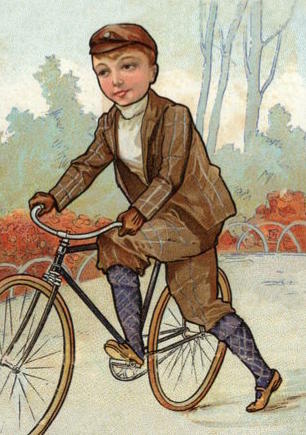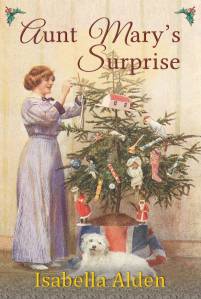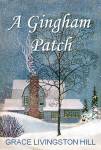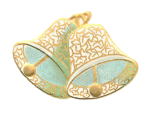Earle and his friends plan to make the days after Christmas special for one deserving family in Part 2 of “Earle’s Afterwards Tree.” If you missed Part 1 of the story, you can read it here.

.
Part 2
Perhaps the Crawfords never had a busier day than that one in which the Hunters went to help keep Grandmother’s birthday. It was such an important day that Mr. Crawford actually stayed from the office for several hours to help!
The Hunters’ sitting-room was found to be in good order, and with so little furniture in it that very little was to be done to make it ready for the tree. But after that was dragged in, and set up in state in the very center of the room, business began.

No “afterwards,” surely, had ever grown after the fashion of this one! There were dollies, and books, and slates, and drawing paper, and Christmas cards, and jackknives, and stockings, and dresses, and caps, and mittens, and hoods, and sacks, and—but what is the use of trying to tell it? One present must be described. It filled Earle Crawford’s heart full almost to overflowing with joy. Robbie Hunter, although he was nearly six years older than Earle, was nevertheless a dear friend of his. Now, Robbie Hunter had remarked to him perhaps twenty-five times already this winter that if he only had a bicycle he could get lots of errands to do for folks and earn a good deal of money.
“You see,” he would say, “we have so little snow here, that a bicycle can be used almost all winter; and things are stretched so far apart that a fellow can’t do many errands before the day is done, if he has to depend on his feet; and as for the street cars, why, they take all the profits.”

Earle had listened and been convinced, and the two had wearied their brains trying to plan some way by which a bicycle might be secured; all to no purpose up to this time. Yet here, standing under the tallest branches of this “afterwards” tree was a first-class bicycle in perfect order, although not quite new, and marked:
Robert E. Hunter; from Santa Claus’ cousin.
“Because,” said the giver, “Santa Claus is supposed to come this way only at Christmas time, but his first cousins scurry over the country for the ‘afterwards’ things.”
When Mrs. Crawford saw that bicycle, she said, “Oh, poor boy! That must have been hard. But wasn’t it noble in him?”
That needs explaining. The bicycle had belonged to Dr. Holland’s only son, Fletcher. It had been a present to him on his last birthday.
“A trifle too large for him just now, perhaps,” his uncle had said, “but I wanted to get one that would last; and he’ll grow to it.”
No, he wouldn’t. The accident which had broken his leg and hurt his hip, happened months before Robbie Hunter was hurt, and now Robbie was out on crutches, and with a fair prospect of throwing them aside in a few days. But Fletcher Holland would never be able to do without his. Oh, worse than that; he knew his father feared that even crutches could not be used much; and that by and by he would be unable to step at all. It was some trouble about the hip which Fletcher did not understand, but he knew the fact as well as though they had told him, which they tried not to do. Yes, it had been hard. It took him one long, bright morning, sitting in his easy chair, with one hand on his crutch and the other just covering the quiver on his lips while he gazed out of the window at nothing, and thought. Should he? Could he? Why not? It was his very own to do with as he would. Robbie Hunter needed it; could help support the family with it, and he, Fletcher …
Then there was a long break even in the thoughts, and Fletcher let go his crutch to brush away the tears lest mama should come in and see them. But he settled it that morning, and sent the bicycle in the afternoon around to the Crawfords, to be ready for the tree.
Well, the busy day was done at last; so was the work. None too soon, although the Hunter family did not get back until after five o’clock. They had not meant to stay so late; but Grandma had cried when they talked of going, and said it was probably her last birthday with them, and they had lingered to comfort her. Because of this, and some other things, the ride home was a quiet one. They had had a good day, and a good dinner. Grandma’s son-in-law was far from wealthy, but he had a farm, and a good many things can be raised on a farm to make a dinner table inviting. Aunt Jane had done her best, and everybody enjoyed it. Yet, in spite of it, the Hunters were getting hungry again. Dinner had been quite early in the day for Grandma’s sake; now it was five o’clock, and it was found to be impossible to forget that they had almost nothing in the house for supper. Oh, yes, they had bread, of course, and some butter; they were not starving; but stale bread and butter which one needed to remember was scarce and high-priced, did not make a very inviting meal. Mrs. Hunter, as she tucked her shawl closer about the baby and snuggled him to her, could not help thinking how dingy and desolate the little kitchen would look tonight with its fireless stove, and the chill of a day alone upon it. Other people too, looked at the Hunter cottage and thought somewhat the same thoughts.

“Isn’t that a gloomy little house where the Hunters live?” Carl Burton asked his father as they drove by on their way from school. Mr. Burton nearly always stopped at the school-house for Carl and Alice; he had them with him now, tucked among the bright-colored robes, and done up in costly furs. The Burtons all turned and looked at the little house.
“Yes,” said Mr. Burton, “it does look rather desolate. The Hunters are having a hard time, I hear. I suppose they will not have much of a supper tonight; and here you and Alice are fretting because I forgot to order the angel cake; when we shall probably have cold turkey and muffins, and I don’t know what not, I presume the Hunters will have to be contented with plain bread and butter.”
Much he knew about it! Mrs. Crawford’s cook, Nannie, and Mrs. Holland’s second girl, Kate, were at that moment engaged in putting the finishing touches to as dainty a tea table as the Burtons themselves could desire.

There was even cold turkey, in delicate pink and white slices, and angel cake, besides. This supper had been Earle Crawford’s final stroke of preparation. “Because, you know, mama, they always have splendid Christmas suppers; and an afterwards Christmas ought to be just as nice.”
Just as Nannie set a plate of muffins on the corner of the stove to keep warm, Kate exclaimed: “There they are! Now let’s scud!”
Away they scurried, out of the back door and down the hill, just as Clara Hunter blew around the corner holding to her bonnet with both hands lest the wind carry it away.
“Give me the key, father,” she had said, “and I’ll run around and unlock the back door so that mother can get in quick, with Baby. And I’ll have a fire in a—Why-ee! We didn’t lock this door, after all! Why, there is a fire, mother! There’s—Oh, mother, mother! What does it mean?”
They were all in the kitchen by this time, Father, and Robbie, and all. For the first minute they stood and stared. There was the table laden with dainties, aglow with light from a new lamp which did not smoke, and had come to stay!
“I didn’t know there were witches nowadays,” said Father Hunter, and he rubbed his eyes.
Robbie hobbled around the table to investigate. “Look here!” he said, “Here’s a card; and it says on it: ‘An Afterwards Christmas from Santa Claus and his friends.’”
At last they got down to that table; the horse having been come after by an unusually obliging fellow from the Works, who said he wanted her right away, and it would be all right to leave the wagon in the back yard for the night; Mr. Crawford said so.
“Good!” said Robbie, rubbing his hands. “Now we can sit right down and eat this supper which the witches have brought, while it is hot. Mother, I wouldn’t be afraid to wager my old hat that Mrs. Crawford’s Nannie made those muffins; they look just like her.”

Whoever made them, the Hunters voted them and everything else splendid; and were not too busy wondering and guessing, to eat heartily.
Once Mrs. Hunter said, with a bit of a sigh, “There is enough on this table tonight to have been spread over several days.” But a clamor of voices silenced her, father joining in.
“Some of our friends,” he said, “have intended it for a Christmas treat; and we’ll enjoy it and be grateful, even if we should be hungry next week.”
It was Mary who finally said that it was getting very warm in the kitchen; shouldn’t she open the door to the other room a crack? Which she did, and exclaimed, and threw it wide open, and behold! There was the “afterwards” tree in all its glory!
I wish I could describe that tree, and the things which lay about it and under it and behind it; and the bewilderment and joy of the Hunter family.
“What can it all mean?” first one Hunter said, then another. And when each had had his turn, they began again and said it over, for nobody knew how many times. By and by Robbie discovered the bicycle; then he shouted so loud that his mother said:
“Robbie, if you were not on crutches you would almost deserve to have your ears boxed! See how you have frightened Baby!”
Then Robbie sat flat on the floor, and laughed, and laughed, until Mary said, “Why, I believe he is crazy!”
Then what did he do but plump his head into a cushion which was under the tree for the baby, and actually cry! He had wanted a bicycle so dreadfully, and had not expected one any more than he expected to have the moon.
Father Hunter, however, had not heard this last uproar at all. He had found a letter. The very letter which Earle Crawford had feared he would not care for, and was reading and re-reading it, and wiping his eyes and saying, “God bless him! That will help us through. I can see daylight.”
It was a very short letter; only a receipt for eight months rent; the two which he was behind, and the six which were to come before the year would close.
Meantime, Mary, and Clara, and Minnie, were finding packages which read: “From your loving classmates,” or, “For a dear girl, from another girl,” or some such equally bewildering statement.
“Here is another letter,” said Mrs. Hunter.
She leaned over her husband’s shoulder to read, and drew a long breath of intense relief as she said: “Oh, children! It is Dr. Holland’s bill, receipted!”

There! I’m going to give it up. I wanted to tell you about it, but I cannot do the subject justice. Earle Crawford declared months afterwards that the very best time he ever had in his life, had to do with that “Afterwards” tree; and every Hunter in the company agreed with him.
“A capital idea,” said Dr. Holland; “a worthy tribute to a good family who had been unfortunate, and needed only a lift over a hard place. And it cost very little time or money. Everybody gave the little that they could get along without, as well as not. There wasn’t a sacrifice in it; except yours, my boy.” And he laid his hand tenderly on Fletcher’s shoulder, his eyes dimming with tears. But the boy looked up brightly and said:
“Never mind, father, I’m getting used to it.”

Merry Christmas to you!
















